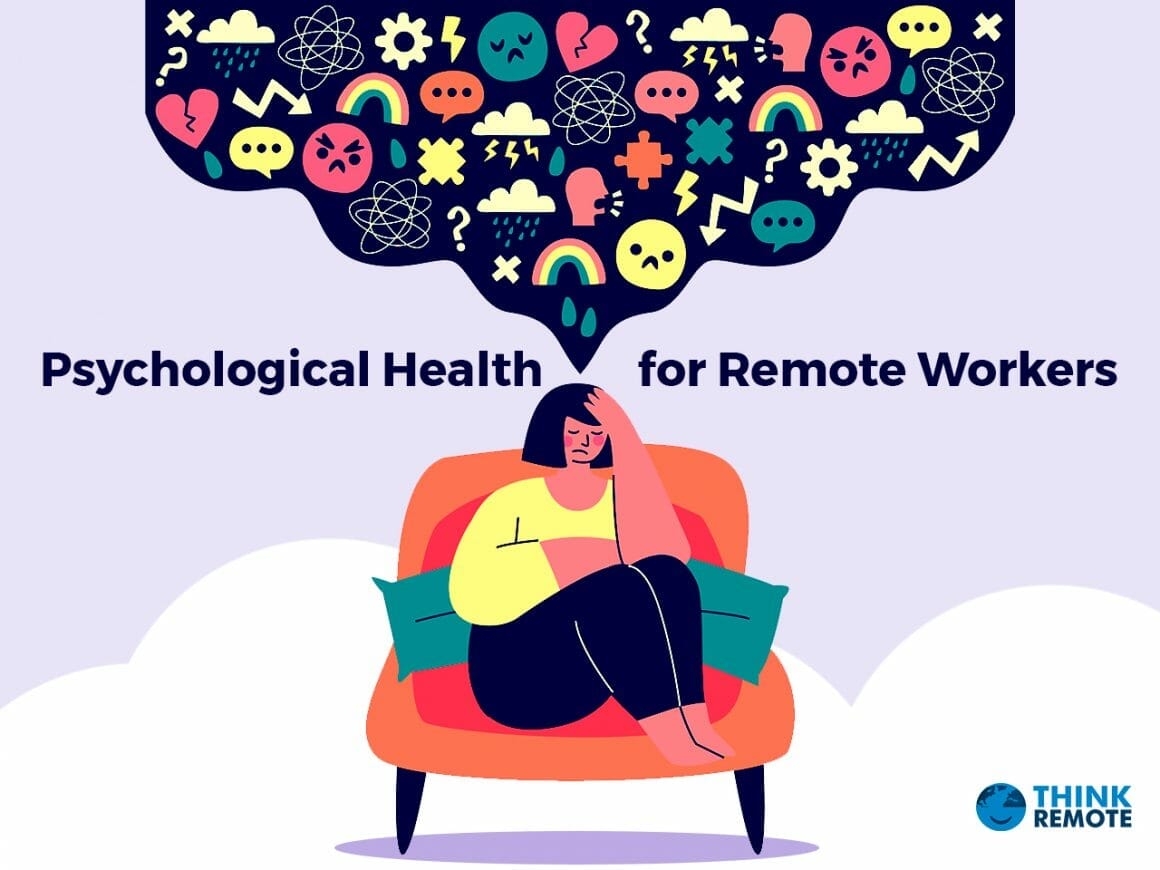You’ve been through a lot; you’re exhausted. For a whole year, you’ve faced a series of challenges that caused you symptoms of stress, overwhelm, and even depression. Yet, in a blink of an eye, almost a year and a half passed since you started working remotely. And let’s be honest, the COVID-19 pandemic had significant effects on your psychological health, more than you ever thought it would. So, what is psychological health in remote workers? And why should you make it a priority?
But before we start analyzing all the stress and drama from last year- let’s be clear on one thing. Remote work doesn’t negatively affect mental health; the pandemic does. Can you compare the 2021 version of yourself to the one from a year ago? Can you even remember?
You’ve probably noticed several mindset changes since you started working from home. A lot of anxiety, fewer hours of sleep, a constant battle with isolation— and when you have the opportunity to go out, you feel frightened or lazy.
“The only journey is the journey within.” Rainer Maria Rilke
Have you ever heard this quote? The German poet and novelist, Rainer Maria Rilke, said it once in a poetry collection, and it was shocking to society. In an age of disbelief, solitude, and anxiety, people didn’t speak publicly about their feelings or thoughts. Yet, the author objected and focused most of his writings on people’s psychological health.
Mental health is a state of well-being in which an individual realizes his abilities, can cope with the everyday stress of life, and can work productively while contributing to his communities, like family, friends, or work. It’s fundamental to a human’s ability to think, emote, interact, and enjoy life. Therefore, the promotion and protection of mental health is a vital concern for societies around the world, but not everyone knows how to take care of themselves.
How Does Remote Work Affect Mental Health?
The COVID-19 pandemic disrupted all global labor markets during 2020, and the consequences were drastic. While millions of workers lost their jobs, others were deemed essential and continued to work in hospitals and grocery stores under new protocols, and everyone else had to adjust to working from home rapidly.
Before the pandemic, the most significant work disruptions surged due to new technologies and the fast-growing Internet. Remote work was a choice; it was a way of life some people chose to experience. But for the first time in history, the pandemic has arised another path of working that didn’t imply face-to-face work to succeed. So, how did inexperienced remote workers cope with this?
According to a KFF analysis on the Census Bureau’s Household Pulse survey, 4 in 10 adults in the U.S. reported symptoms of anxiety or depression due to the pandemic. These presented their psychological health negative aspects, such as difficulty sleeping, eating, an increase in alcohol consumption, and worsening chronic conditions.
In the last year, worries and stress over the coronavirus became the most influential factors to remote workers’ psychological health. As a result, millions lost their jobs, and others had to adapt to a new and unfamiliar way of working. Some of the causes remote workers point out as responsible for the decrease of their psychological health are:
- Pandemic-related occurrences, like closures of universities, schools, or offices.
- Economic downturns caused people to lose their jobs, increasing their depression, anxiety, distress, and low self-esteem.
- Children and parents, particularly mothers, went through several challenges with school closures and a lack of childcare. As a result, working became impossible for them, and several workers became unproductive and ineffective at their tasks.
- Fear of contracting the virus. Besides economic and work-related problems, people felt afraid of getting COVID-19.
- General isolation. Almost everyone was working from home. So, people could face two possible scenarios, an imposed lockdown by their government, or an extreme fear to go out. Both of these contribute to their isolation!
Psychological Health Awareness for Remote Workers
People had to adapt to new work routines and remote practices that they didn’t know. To no one’s surprise, they blamed remote work for their psychological health problems.
An estimated 20% of the population lives with mental illnesses in the U.S. Therefore, every May, people celebrate and highlight the importance of taking care of your mental wellness. Last year, risk factors for psychological disorders became more severe, so for 2021, the theme was Tools 2 Thrive, focusing on helping people find healthy ways to cope with stress.
The effects COVID-19 had on mental health were notorious, and most people don’t want to turn a blind eye to them. Nowadays, remote workers are aware and understand the importance of prioritizing their psychological health, but do they know how to do it?
How To Maintain Psychological Health and Wellness While Working from Home?
The first thing you should know is, you’re not alone. The fact that you’re the one who must cope with the negative consequences of remote work doesn’t mean you need to do it alone. On the contrary, work teams should encourage mutual help and assistance.
According to RSPH’s survey, employers should ensure that all employees have access to mental health support to help them cope with increased isolation and anxiety due to working from home. Also, employees must have access to equipment and remote assessment to support them with their physical health, and organizations should develop a culture that encourages work-life balance.
But since the complex 2020, employees have also acquired different practices. They became more individualistic while working from their homes and forgot they had a whole team – and in some cases, an entire company – to support them. The more you isolate, the less you want to be around people, communicate or connect with them.
So, how can you prevent your remote worker’s psychological health from these situations?
1. Communication
Why do you close to yourself while working remotely? And I know you do because we all do!
Communicate with your team as if you were working beside them. Talk to your colleagues to know how they are, their plans for the weekend, or how their sick dog is feeling. But, again, it’s the casual talk that will bring you closer, not the work stuff.
Use multiple communication channels. For example, you can email them for critical issues, chat with them through Slack for urgent tasks, and have virtual meetings for informal conversations. The variety of communication channels is what will make you feel more comfortable and closer as a team.
2. Ask for help
Have you ever felt so overwhelmed that every task you do feels impossible? You probably have, and the truth is, you can’t deal with everything!
I know you may think you’re capable of solving all your problems by yourself because you have strength and courage. But the truth is, you’re not a superhero. You may have the custom and a shiny cape in your basement’s closet, but that doesn’t necessarily mean you have to behave like you have superpowers all the time. Facing difficult situations is human.
So, ask for help. Pitch a colleague when you feel stuck on something, or even when you think you cannot do it. People tend to hide their weak moments, but there’s nothing terrible about feeling helpless; it’s what makes us human!
Also, employers have to take responsibility for their remote workers’ psychological health. Probably, it was easier for them before since they could visualize results in the office. But traditions change, and businesses should too.
Companies have to follow their remote workers’ psychological health and make sure they are on the right track, and when they’re not, assist them with the necessary tools and support their needs. Whether this support means connecting team members with mental health professionals in their region, such as therapists in Las Vegas, adjusting their workload, or anything else, employers have a responsibility to act.
3. Take breaks
Learn to rest your mind. It’s not all about work; you are allowed to have recreational activities during your workday. And they’ll help you improve your performance!
Do you know the term work-life balance? Having a work-life balance will let you create a healthy work environment at your home, reducing your stress and helping you prevent burnouts at your workplace.
Focus on balancing your activities. Nothing in excess is good. Choose the good from your personal life and the good from work, and amalgamate those activities into your routine.
Benefits of Prioritizing Your Remote’s Team Psychological Health

As time passed by, people started prioritizing psychological health. After the pandemic, remote workers are more aware of their mental state than ever. Several global employers implemented health promotion strategies, and according to Ho, 70% of employers started offering wellness programs.
Workplace wellness programs help create a win-win situation for everyone in a company. But also, employees need to focus on what they can do with what they have and what they can take out of the context and circumstances to grow. Ph.D. Noam Shpancer says in the report: “Mental health is not a destination, but a process. It’s about how you drive, not where you’re going.”
Decreased Stress
When employees go through stressful periods or situations, they become unproductive. They lower their productivity, reduce their morale, and sometimes even fall into absenteeism. Companies need productive people who encourage leadership and tenacity, and they can’t cover all costs of stress.
Instead, if they implement psychological health programs for their employees, they’ll invest in their well-being and the company. When people feel supported and accompanied, they perform fantastic results.
According to a Harvard report, chronic work stress can lead to a psychological syndrome known as burnout over time. Warning signs of burnout include overwhelming exhaustion, cynicism, and a sense of inefficacy.
Take this into consideration for your future decision and for the way you want to handle your work. As a result, employees with lower stress levels prove to have quality sleep, reduce their body aches and pains, and more motivation to create psychologically healthy routines, all due to lower stress levels!
Reduced Costs
Employees are an investment for businesses, and the more qualified they are, the more expensive they’ll become. But, what if one employee has a mental breakdown and the company has to take responsibility (financial and psychological)? Can you imagine how much this can cost?
If companies encourage psychologically healthy practices and wellness programs at work, employees will feel happy and supported, and they won’t need any personalized expensive assistance.
“Employers have had a vested interest in providing preventive health-related services for almost a hundred years now,” reported Michael Raymond Rucker, member of the Organizational Psychology Department, in Ho’s report. However, if companies have always invested in health care for employees, now more than ever is the time to refocus those aims and promote remote workers’ psychological health.
Greater Productivity
When you’re productive at work, you enter the “virtuous circle.” You’re productive; you’re happy at work, feel more motivated because you have great results, and incite productivity within your teammates — a positive energy chain of success.
Surprisingly, productivity increased after the pandemic, and remote workers managed their tasks perfectly. Recently, a survey by ConnectSolutions reported 77% of remote workers had improved their productivity levels during 2020. This increase in performance attributed its results to a quieter and more convenient working environment.
Some employers have already dealt with their remote workers’ psychological health during this last year. And they’ve incorporated the necessary tools and practices to assist them remotely.
Increased Morale and Improved Relationships
When you feel healthy, everything goes better, right? You’re more willing to demonstrate goodwill and motivation with others and with yourself. Therefore, you have the ability to positively impact your team.
The fact you’re working from home isn’t an excuse to avoid empathizing with your coworkers. A good attitude will be the key to improving your psychological health. And organizations can also help encourage morale between workers through financial or symbolic rewards for participation with teams or projects.
Feeling stressed or anxious will lead you to reject your colleagues or become uninterested in knowing them better. But willingness is the key to start anything, and it’s contagious!
You’ll realize the importance of your willingness and motivation at work, not only for yourself but around your team. General results will be better, and you’ll get to know each other more, building long-lasting relationships.
Psychological Support Is a Priority!
Nothing is impossible. Take step by step, there’s no need to rush into anything you or your work team don’t feel comfortable with.
As a remote worker, it’s time you start prioritizing your psychological health to improve the quality of your life and help take care of others. It’s not easy to be a member of a remote team, there’ll be times when you’ll feel weak or insecure, but we all do! And that’s when you’ll remember the ways to support each other, prioritizing your mutual psychological health.
Needing support is human, and it’s crucial remote work teams practice on this every day. In addition, the pandemic affected your psychological health, so take those consequences into lessons and prioritize general wellbeing.
And remember, there’s nothing wrong with asking for help. Like Bill Withers said in his remarkable song, “we all need somebody to lean on.”






